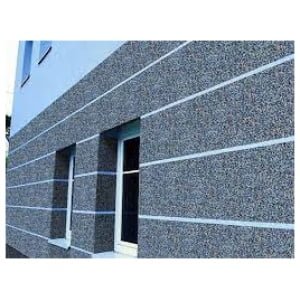Mosaic Renders
Mosaic Renders — Durable, Decorative Resin Finishes for High‑Traffic Areas
Mosaic renders are resilient, resin‑bonded stone finishes designed to protect and decorate high‑traffic walls and plinths. They resist abrasion, splashes and dirt pickup while delivering a clean, stylish look. Ideal for ground‑floor façades, stairwells, corridors and entrances, these systems balance impact resistance with easy maintenance and long‑term durability. For best results from day one, pair a CT177 mosaic render with a quartz primer on correctly prepared substrates.
Where to use and why
Choose a mosaic render for areas exposed to frequent contact, road spray or intensive cleaning. The tough, stone‑chip texture helps conceal marks and provides a uniform appearance on corners, reveals and plinth zones. Indoors, it’s a practical choice for busy circulation spaces; outdoors, it stands up to weather and everyday wear without sacrificing visual quality.
Colours, textures and components
Our range includes popular resin stone finishes in multiple grain blends and curated colourways to match contemporary and traditional schemes. For a proven all‑round option, see Ceresit CT177 Mosaic Render (available in 10 kg and 25 kg with a wide palette of colours). For colour planning, browse our Render Colour Charts before ordering to achieve consistent results across façades and plinths.
Substrate preparation and primers
For best adhesion and even texture, prime with a quartz contact primer matched to the system. Use Ceresit CT16 Quartz Primer or Atlas Cerplast Quartz Primer depending on your specification and substrate. You can also view all Wall Primers for alternative coverage and drying‑time options. Proper preparation helps the decorative stone layer cure evenly and improves long‑term resistance to soiling.
Applications and compatibility
Mosaic finishes can be applied to correctly prepared basecoats, traditional renders and selected interior substrates. Always verify compatibility with existing coatings and ensure stable, clean, dry surfaces. For façade areas with intense sun or heat, adjust working time and shading as needed to maintain a consistent texture; see this practical guidance on render choice vs. environmental conditions for site‑specific tips.
These decorative systems include mosaic renders suitable for UK residential and commercial projects, providing robust performance in entrances, ground floors and exposed plinth zones.
Popular products
- Ceresit CT177 Mosaic Render — resin‑bonded stone finish for interior/exterior plinths and high‑traffic walls
- Ceresit CT16 Quartz Primer — quartz contact primer for decorative topcoats
- Atlas Cerplast Quartz Primer — high‑adhesion primer to even out absorption and support uniform texture
- Render Colour Charts — colour resources to finalise your scheme
Expert support and UK‑wide delivery
Speak to our technical team for help with specification, primer selection and coverage estimates. We supply nationwide from our Southampton base with fast turnaround and reliable delivery windows for contractors and DIY renovators.
FAQ
What is a mosaic render and where is it most useful?
It’s a resin‑bound decorative stone finish designed for durable, easy‑clean surfaces. It’s especially useful on plinths, entrances, corridors and other high‑traffic zones where impact and soiling resistance matter.
Do I need a quartz primer before applying a mosaic render?
Yes. A quartz contact primer promotes adhesion and helps achieve an even texture. Use Ceresit CT16 or Atlas Cerplast according to the chosen system and substrate condition.
Is CT177 suitable for both interior and exterior applications?
Ceresit CT177 Mosaic Render is a versatile option for internal and external use on prepared substrates, delivering a robust, decorative stone finish in a wide range of colours.
How do I choose colour and grain?
Start with existing façade materials (brick, stone, cladding) and adjacent finishes. Then select from our Render Colour Charts and check sample areas in consistent lighting to confirm your final choice.
What environmental conditions should I watch out for?
Avoid application in strong sun, high heat or rain. Plan working times, shading and cure windows to keep a uniform texture. See more tips in our guide on environmental conditions.



